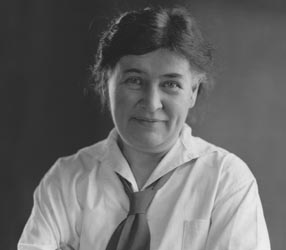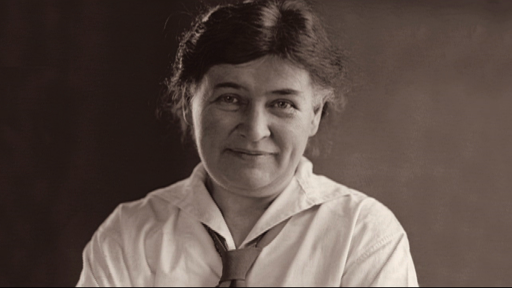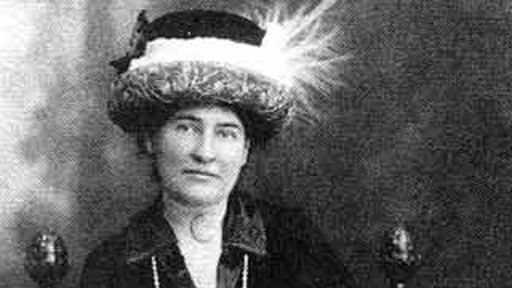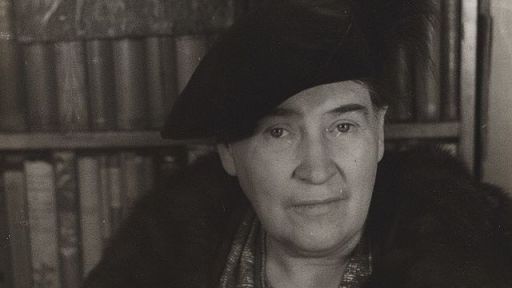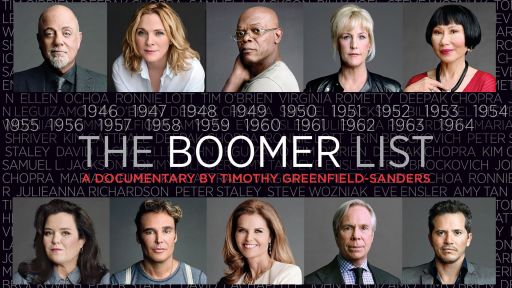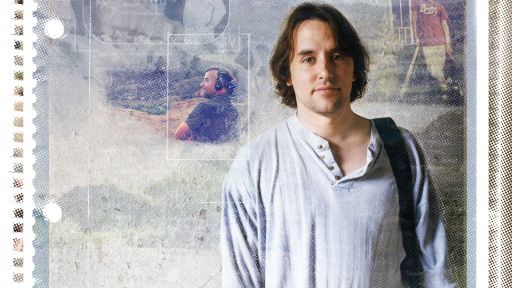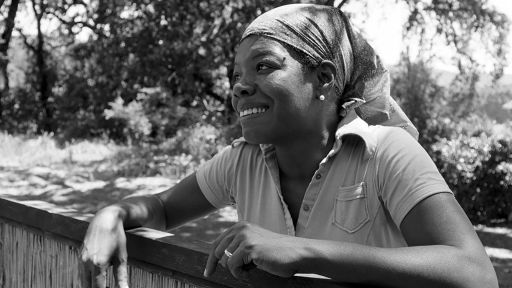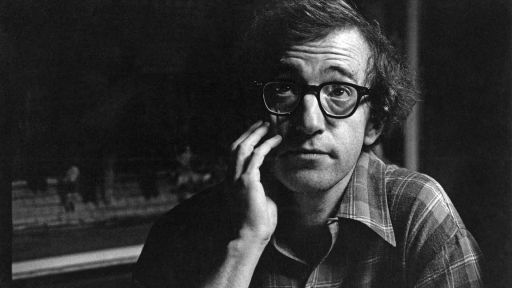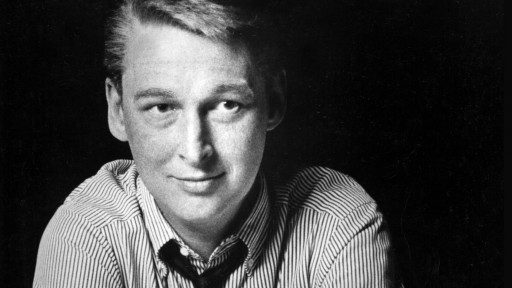The Road is All
Willa Cather wrote about the lives of early Nebraska pioneers in such books as O PIONEERS! (1913) and MY ANTONIA (1918). This is an interview with the filmmakers of WILLA CATHER: THE ROAD IS ALL: Producer/Writer, Christine Lesiak, and Producer/Director, Joel Geyer.
Q: Discuss the collaborative process between the two of you as producers of this documentary film.
CHRIS: What was it like to collaborate? Joel and I have worked together for 25 years, and it seemed about time that we did a project together. And Willa Cather was perfect because we both love Willa Cather and we felt that we would bring different sensibilities to it. I wrote it. Joel directed it. And you know, there was a lot of struggle getting to that point where we came to the same vision. I mean, there are probably still places where Joel cringes and places where I cringe, but the point is, the piece works. So it was a useful and workable partnership.
JOEL: And I think the program is sharper because to do something major with the narrative or the direction, we both pretty much had to agree on it, and so we had to justify our ideas and then make sure [to] articulate them more carefully. And I think it actually makes the ideas sharper, since you’re clear about what your objective is.
CHRIS: This is the result of 25 years of reading Cather, talking about Cather, and wanting to do this project, I think, for quite some time.
Q: Why is Willa Cather an AMERICAN MASTER, and why now?
JOEL: But I think the reason that it’s important to us now is the pace of change is so fast in our society that we are all on the frontier of ourselves. We are all immigrants and migrants to new areas and new territories, and the only way to approach that is to grow and change and adapt. And Cather has many great lessons for that. And I think that her story of the pioneer, the kind of courage and vision it takes to stand on a new frontier — the frontier of ourselves, if you want to think of it that way — and adapt and change and grow, there’s never a better time than now to tell that story.
CHRIS: And why now. I mean, Willa Cather’s still a strong, strong woman. I mean, we’re living in a society with strong women. But she stands out even today because she did exactly what she wanted to do with her life. She made up her mind as a child she was going to be someone important. She wasn’t sure exactly what she was going to do to make her name. She was going to be a doctor and then later on a writer, but she knew that she wasn’t going to settle for the woman’s role of being married and having a family and you know, being — playing second fiddle to anyone else. She was going to be Willa Cather. And she succeeded and she’s a huge inspiration to women today.
Q: Explain the process of funding CATHER.
JOEL: One of the things the National Endowment can do is fund things that aren’t clearly commercial. If you think of people like James Dean, Clint Eastwood, big stars who already have a good audience, it’s easier to get funding for those projects. But for people who, like Willa Cather who are very interesting and very worthwhile, but don’t have that kind of commercial appeal, it’s a perfect match for the National Endowment for the Humanities. And they were the major funder on this project.
Q: What is the meaning behind the title of the documentary, WILLA CATHER — THE ROAD IS ALL?
CHRIS: The end is nothing, the road is all. We had a heck of a time coming up with the title for this program. And that ended up being the title. It’s one of Cather’s favorite sayings. I don’t know if she actually came up with that saying herself. I’m not really sure what the source of it is, but I do know what it means, and what it means is “live in the moment — look at what’s around you.” And she learned that from being a pioneer. I mean, when you arrive in a brand-new landscape, a place you’ve never, never been before, where there’s no trees, there’s no houses, there’s no neighbors, all you see is land all around you, you have to kind of reinvent yourself. You have to look around and see what’s there and take the moment as it is. And I think that’s what she learned from coming to Nebraska as a very young child.
Q: What did you learn about Cather that surprised you?
CHRIS: When I read her life story and studied her life story and then read her books, there were many, many places where they were one and the same. It was a documentary that I was reading. Certainly that’s true of MY ANTONIA. And others were thinly veiled Willa Cather. They were perhaps not Willa Cather as a person, but they were her experience, her emotional experience. The professor in THE PROFESSOR’S HOUSE, who’s written historical novels and is sitting in his room and thinking, “Is there life beyond this? What does my future hold?” — Willa Cather was in the exact same place in her life when she wrote that book. So she was using her novels as a way of both remembering what had happened to her and to the people around her and a way of working out her own personal anguish, and that surprised me. I didn’t realize how deep that went.
JOEL: The other thing I learned about Cather was in reading her letters you find a vulnerable person and a more real person, a more human person than you find in her prose. There’s something about her prose, and even her official presence, when she spoke to groups and said other things, there was always this kind of formal veil. And you read some of her letters and you realize that she had petty jealousies. That she had personal concerns about her life. And I think that’s why Chris starts the program with Cather being somewhat mysterious, is Cather wanted to control her image. She wanted to control how she was perceived, and in reading some of her letters, which we quote from, you start to see a little bit behind the veil and get a sense of somebody who I actually like a little better than the formal Willa Cather, which is a vulnerable, more human Cather.
Q: For years, scholars and readers have speculated about Cather’s sexual orientation. How did WILLA CATHER — THE ROAD IS ALL address that question?
JOEL: I think it was one of the biggest challenges of the program, was to deal with the sexuality, because there were some who felt very strongly that Cather was at least bisexual, perhaps homosexual. And then we had one biographer who thought that she was very definitely a heterosexual.
CHRIS: We don’t know. We don’t have really a clue as to what Cather did or didn’t do in bed. So really, there wasn’t anything that we could say that was definitive, so we decided to simply ask our interview subjects, and they came through with flying colors. I mean, they said it all. And they said it with complexity and they said it with mystery and they leave the question open, which is where I think it belongs.
Q: Discuss the popularity and legacy of Cather’s work with the critics, the public, and among her peers.
JOEL: It was interesting for me to discover how big she was in her time. She was on the cover of TIME magazine in 1934 and had the most widely read novel in the country at the time, SHADOWS ON THE ROCK, which was not her greatest work. And it’s like a lot of artists, they’re discovered late in their career, but I’m sure it encouraged people to go back and re-read some of her works. I think Cather’s going through a renaissance right now and she’s starting to recapture some of that glow from the earlier time. And I think it’s for what we’ve talked about earlier: the pioneer experience is a very contemporary experience. We’re not on the frontier physically in terms of landscape, but we’re on the frontier of pioneering our own futures, and people like to see how people deal with that frontier experience. Where the past is no sure guide to the future. Where you have to improvise. Where you have to create. And Cather’s stories about people with courage and vision are a perfect metaphor for our times.
CHRIS: Well, Cather herself said that she didn’t think a book could be considered great until it had been out for at least a hundred years, because you just don’t know. I mean, the best-seller of today is forgotten tomorrow and Willa Cather’s work is not a hundred years old, but it’s getting there.
JOEL: It’s pretty close.
CHRIS: Yeah. And it’s still with us. And as her books come into public domain, movies are made, even though she wouldn’t have liked that, but the fact is she’s still there in our consciousness and she still has quite a lot to teach us. And I think that the hundred-year test is going to work for Cather. She’ll still be here in a hundred years. She’ll still be here in 200 years. And how many authors can you say that about? She wasn’t popular with the critics in her later years, but the public was still reading her. And as Joel said, you know, her books were still best-sellers and you know, she was still beloved by her readers, and I think that’s been always true for Willa Cather. You know, readers love her books, and always have. And the critical acclaim has gone up and down, but they keep reading her.
JOEL: F. Scott Fitzgerald idolized Cather and he wrote her glowing notes. She was one of the big figures when he was just beginning his writing and so I think she was very active among the big boys at the time, and it’s wonderful that in this series, the AMERICAN MASTERS series, we’re going to see F. Scott Fitzgerald, then Cather, and then Hemingway.
CHRIS: Well, you know, F. Scott Fitzgerald was inspired by Willa Cather’s A LOST LADY and based his Daisy in THE GREAT GATSBY on that characterization that Willa Cather wrote. So yeah, I mean, the big guys liked Cather for the most part, although as Joel said, they were threatened by her. I think she liked their work. She just simply didn’t want to be put in a ghetto of women writers. She wanted to be considered a writer, a great writer, just like everybody else. She didn’t want to have a special tag put on her. And I think she got her wish.
JOEL: The top-10 lists of writers in America by year, actually 1905, 1906, 1907, you read those top-10 lists and you don’t recognize nine out of the 10 people. Here Willa Cather’s on the list ,and who are these other nine people? You’ve never heard of them, which is a sign that she was popular in her time, but that her work has also endured. And it helped me see, when I look at the top 10 novels today and some of the mystery writers and romance writers and action writers, it won’t even register a hundred years from now. Cather will register a hundred years from now.
Q: What do you think Willa Cather would have thought about this documentary?
CHRIS: I don’t think you could make a program about Willa Cather’s life that would satisfy Willla Cather. No matter what you said, it wouldn’t be what she wanted you to say. She’s a very controlling person. And secondly, she hated the media. She hated movies. She would have hated television the way it is today and would have probably never watched it, probably wouldn’t have had one in her apartment. So I mean, even if we made the greatest biography of Willa Cather possible, I think Willa Cather would have hated it.
JOEL: If anybody asked her what she thought of it, she would say that “They have no right to delve into my life like this. They have no right to interpret. They have no right to bring all these people together and examine my life. They should read my works. That’s what’s important.” But I think just as she’s falling asleep at night, she’d be so satisfied that she was getting all the attention. So I think she’d be of two minds about it.
Q: Any final thoughts for viewers of this program?
CHRIS: What would I like people to take from watching this program? Well, first of all, just the courage to spend your life finding your own voice, which is what she taught us through her life. And second, the desire to go out and read a Willa Cather book.
JOEL: With each new novel, Cather didn’t repeat herself. She took on new challenges and said new things. And that’s such an inspiration for any of us, is that you can find certain tricks in life that you repeat and help you get through, but to really be alive and to be in the moment, you have to create a new future. And what an inspiration Cather was for that.

